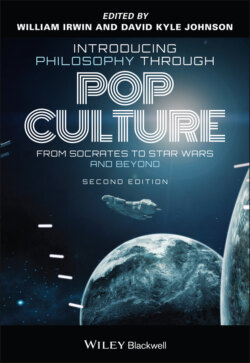Читать книгу Introducing Philosophy Through Pop Culture - Группа авторов - Страница 15
The “Danger” of South Park
ОглавлениеIn the episode “Death” Kyle's mother leads a boycott of the boys' favorite cartoon show – Terrance and Phillip – because of its continuous farting, name‐calling, and general “potty humor.” While the parents are up in arms over this “moral” issue, the boys wrestle with the problem of euthanasia for Stan's grandfather, something none of the parents will discuss with them. “Death” brings together many of the central issues that have made South Park successful and controversial – vulgarity, the misplaced moral concerns of American culture, the discussion of controversial moral topics, and the criticism that South Park itself is a “disgusting” show. Since “Death” the criticism of the show has only grown – getting even bigger than Cartman's fat ass – drawing fire for its obscene language, criticisms of religion, and emphasis upon freedom of speech.1
Like the parents protesting Terrance and Philip, critics of South Park make claims that are strikingly similar to those that have been leveled against Western philosophy since its beginnings. It mocks religious beliefs, leads younger folks to question accepted authority and values, and corrupts our children and culture. The “it” in the previous sentence refers to South Park, but in fact, the same criticisms formed the basis for Socrates's (470–399 BCE) trial and execution in Athens, Greece in 399 BCE.2 So, in this chapter we'll explore the heretical possibility that people perceive South Park as dangerous precisely because it is a form of philosophy. The “danger” that South Park poses has to do with its depiction of dialogue and free thinking. In the end we will have learned something: Like Socrates, South Park harms no one. Philosophy and South Park actually instruct people and provide them with the intellectual tools they need to become wise, free, and good.
